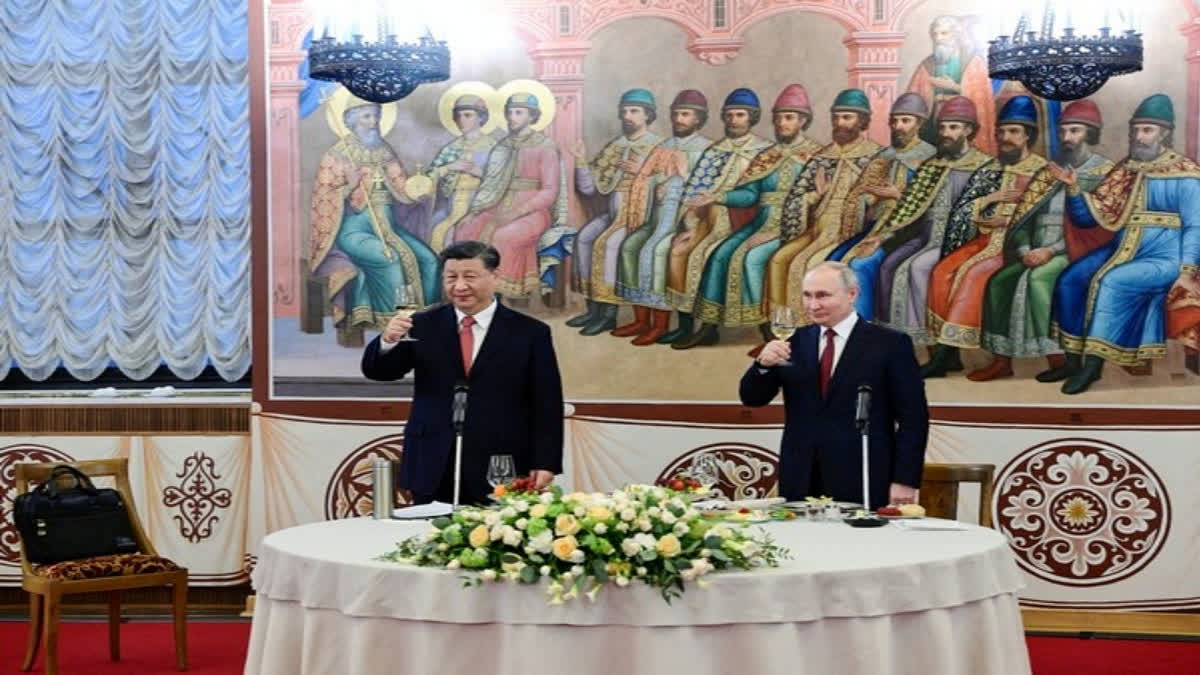New Delhi: Chinese President Xi Jinping's recent visit to Moscow and his meeting with Russian President Vladimir Putin have raised questions about the potential geopolitical implications in the region. The meeting between the two superpower leaders occurred in the aftermath of the Russian invasion of Ukraine, indicating China's commitment to strengthening ties with Russia and supporting President Putin. This development has direct implications for India, which may see its political, diplomatic, and military support from Russia diluted or eliminated as Russia increasingly depends on China.
Foreign policy expert Namrata Hasija, a research associate with the Centre for China Analysis and Strategy, explained that the process of Russia becoming China's junior partner is well underway. She warned that this increased Russian dependence on China could impact India's ties with Russia on the diplomatic and military front. These events suggest increasing Chinese belligerence towards India, so Hasija suggested that India focus on indigenous production or partnership with the US and Japan to protect its interests.
President Xi's visit to Moscow was watched carefully by the international community, especially the West, as it signaled China's determination to strengthen its relationship with Russia. This development could be worrisome for the US, which has strained relations with both China and Russia. As China grows stronger and more influential, the growing China-Russia partnership is a matter of concern for the US, especially in light of the war in Ukraine, which China has refused to condemn.
Also read: In Putin and Russia, Chinese President Xi sees a 'counterweight' to American influence: White House
Despite these concerns, Russian Ambassador to India Denis Alipov claimed that Russia-India strategic alignment would not be impacted by growing Russia-China ties. India's stand on the Ukraine conflict remains firm despite pushback from the West and sanctions against Russia. India continues to buy Russian oil, putting its international reputation at risk.
During his visit to Moscow, President Xi emphasized that China and Russia are friendly neighbours connected by shared mountains and rivers. Both countries have grown their bilateral relationship based on no-alliance, no-confrontation, and not targeting any third party, setting a fine example for developing a new model of major-country relations. The growth of China-Russia relations has not only brought tangible benefits to the people of both countries but also made important contributions to the development and progress of the world.
As major countries in the world and permanent members of the UN Security Council, China and Russia play crucial roles in international affairs. Xi emphasized that in a world of volatility and transformation, China will continue to work with Russia to safeguard the international system with the UN at its core, uphold international law, and promote the basic norms of international relations based on the UN Charter's purposes and principles.
Also read: In Putin and Russia, Xi sees a counterweight to American influence: White House
Putin praised China's growth trajectory and reaffirmed Russia's strong bond with China, demonstrating their friendship to the world. According to the Chinese Foreign Ministry, the two leaders jointly signed and released the Joint Statement of the People's Republic of China and the Russian Federation on Deepening the Comprehensive Strategic Partnership of Coordination for the New Era at the Kremlin in Moscow.
Regarding the Ukraine issue, both sides agreed that the United Nations Charter's purposes and principles must be observed, and international law must be respected. The Russian side spoke positively of China's objective and impartial position on the Ukraine issue. The two sides opposed any country or group of countries seeking military, political, or other advantages to the detriment of other countries' legitimate security interests.
The Chinese Foreign Ministry statement further noted that the Russian side reaffirmed its commitment to the resumption of peace talks as soon as possible, which China appreciates. The Russian side also welcomed China's willingness to play a positive role in the political and diplomatic settlement of the Ukraine crisis and welcomed the constructive proposals outlined in China's Position on the Political Settlement of the Ukraine Crisis.
In conclusion, President Xi's recent visit to Moscow and his meeting with President Putin signal China's determination to strengthen ties with Russia and support President Putin. This development could have geopolitical implications



